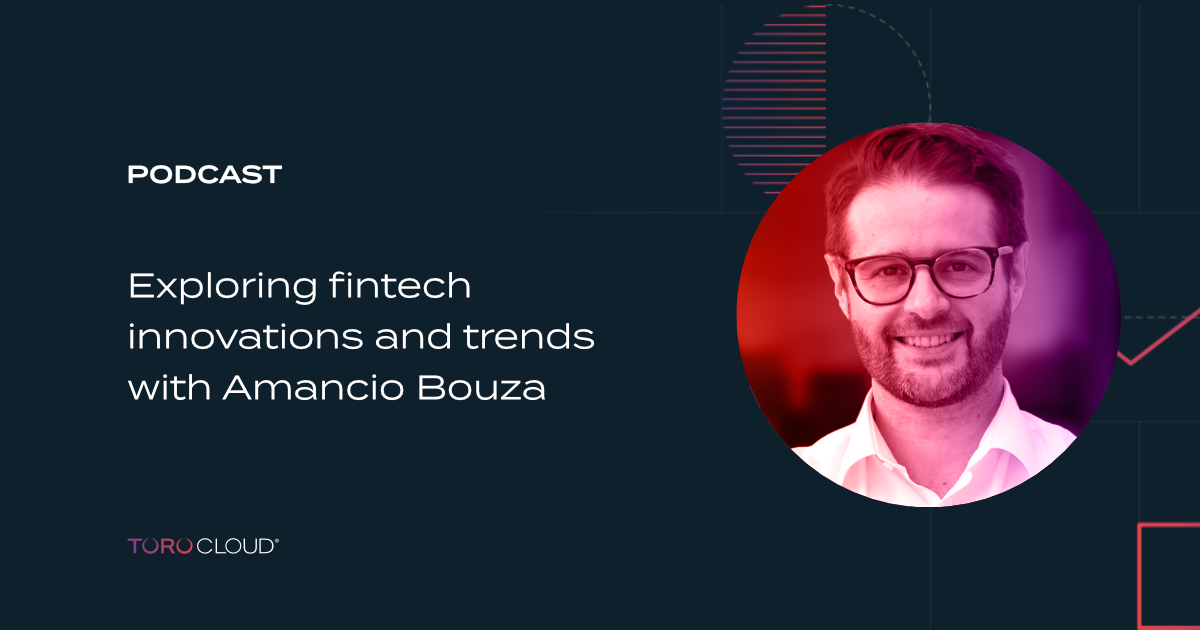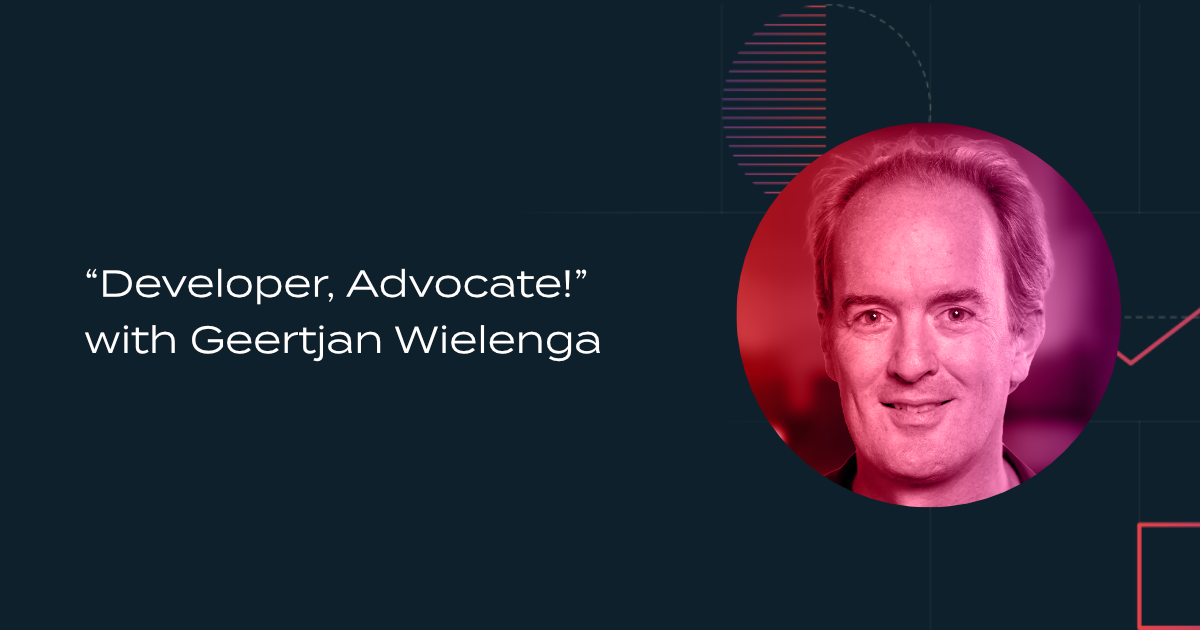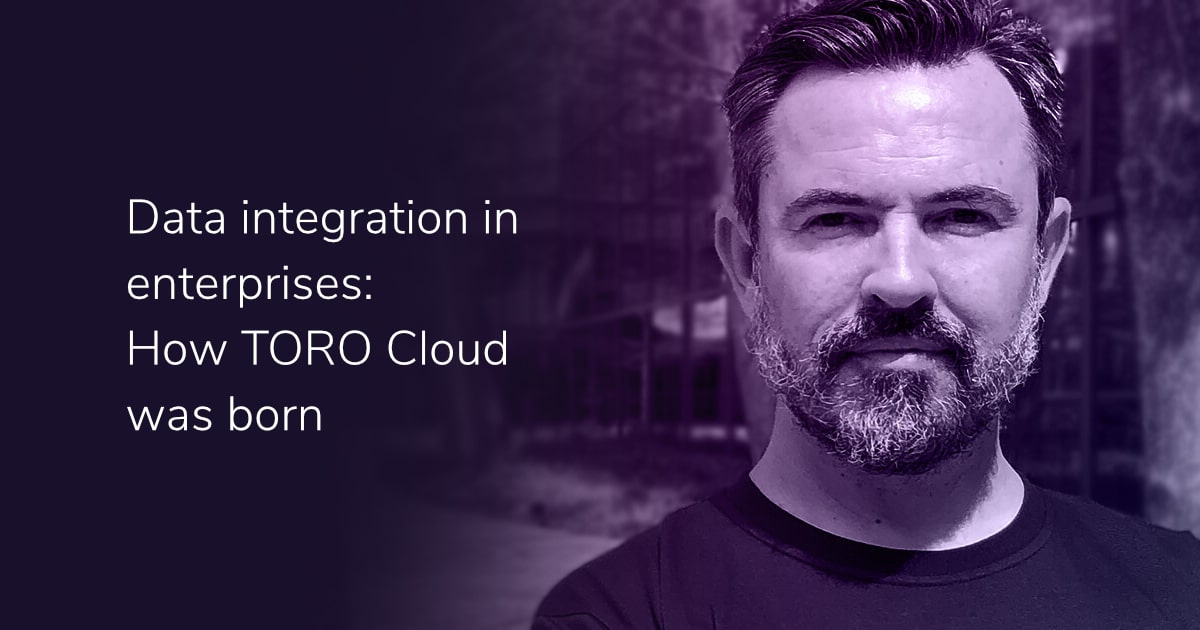
Episode outline
- Amancio Bouza discusses the role that fintech startups play in helping traditional financial institutions adopt new digital solutions.
- What innovations are driving investments within the financial services industry?
- What can companies and consumers look forward to when it comes to autonomous finance?
- How does Open Banking bring innovation to the fintech industry?
- What is BaaS and what do we expect to see from it?
- Were companies really able to truly digitally transform during the pandemic?
Transcript
Kevin Montalbo
Welcome to episode 53 of the Coding Over Cocktails podcast. My name is Kevin Montalbo. Joining us from Sydney, Australia is Toro Cloud CEO and founder, David Brown! Good day, David!
David Brown:
Good day, Kevin!
Kevin Montalbo
All right. Our guest is an API thought leader taking on many roles in the tech space, serving as a digital ecosystem advisor, technical lead consultant for various organizations and co-author of the book API Product Management: Product Strategy and Execution for the Digital Economy. He recently became the Chief Product Officer for Contovista AG, an organisation that enables data-driven banking.
We had him over last year to talk about digital transformation in the new normal. Today, he joins us once again for a second round of cocktails. Ladies and gentlemen, Amancio Bouza. So, it's great to have you back!
Amancio Bouza
Hi Kevin! Hey David, thanks for having me! Always excited to be here with you guys.
David Brown
All right, it's our pleasure. Thanks for coming back. You're our first guest to actually come back to the program, so that just shows how much we enjoyed the first one. Let's jump in and talk about your role at Contovista AG. You’re the Chief Product Officer there. We understand the company leverages new technologies to turn bank data into meaningful applications. So what role can Fintech startups play in assisting traditional financial institutions to adopt new digital solutions, which I imagine the company that you've joined is innovating in that space?
Amancio Bouza
[Banks] are more curious about optimising processes, selling products, but not curious about who the customers actually are...
I think the major role that startups can do is to really provide kind of a different perspective on banking. Because from what I saw so far with banks, they live in a sort of a bubble. It's an old industry, always doing the same and always [going] “Okay, we have products and people come to us to get some money.” And nowadays with the internet, all the new fintechs rising, the users and end-customers expect a different thing.
And our role, as startups in fintech, is really helping the banks to first, start with the customer and really understand what their needs are and really help them with their curiosity part, because that's what they’re missing sometimes. They are not curious about the end customers. They're more curious about optimising processes, selling products, but not curious about who the customers actually are, really kind of on a personal level, and also what are their goals outside of their banking products and services?
And the big role here is really to help them with the curiosity, educate them [about] what really customers want, because it's always funny. For instance, “We provide a wide array of solutions for e-banking and we're integrated.” Then we ask, “Okay, how many users are using this feature? Who are your users?” They don't do the analysis. They have no clue about how many people are using e-banks. And we help them truly understand their customers based on financial transactions of course, and also their goals and for the customers to get better financial habits. I think this is one big role that we have to do. So, adding the curiosity and educating the banks about their customers.
And the second part is, maybe you have this picture in mind. There are two guys pulling kind of a car but the wheels are quadratic, not round. There comes a consultant telling you you need this round wheel and it becomes easier. And they're really stuck in there – in all their processes, they know they're slow, it needs a lot of alignment, a lot of compliance. And what you as a fintech or start-up can really provide is, kind of, speed, because they are almost looking outside of their company to really bring their ideas or strategies forward to progress. So, [it’s] really speed and simplicity. It doesn't have to be the perfect solution but something that can be really integrated really fast. That's what the banks are really looking forward to.
David Brown
Yeah. Before we get into the questions about the fintech industry and general questions about what's driving the space and the like, what I find interesting about the role you're playing with Contovista is you're actually partnering with the banks. You're not trying to disrupt the financial sector and become a new payment mechanism or the banking system or whatever it may be. You're actually trying to facilitate digital transformation with existing banks, modernise them, get them to understand what the customer is after. Is hat right?
Amancio Bouza
Yeah that describes it perfectly. I mean, you can always choose to replace the banks with new services. or leverage all the experiences, all the assets of banks, the products and the whole company to really provide value to the world.
David Brown
So, what would be the deployment model there? Because most fintechs would have a cloud-based sort of service. But if you're trying to deploy those kinds of services within the bank's existing infrastructure, for example, you mentioned e-banking. They don't know what analytics of usage and all sorts of stuff. So, if you're wanting to make modifications to the existing infrastructure, that's going to require privacy and security-related concerns with that bank, third-party certification, all the rest of it. So, what is the deployment model when you're partnering with these banks?
Amancio Bouza
So, doing all these ways to really provide a white label solution so it gets installed within their infrastructure and they can integrate it into their front end. I mean either you provide a database with the front end so they can easily integrate it into the web use, or provide APIs because, let's say that the larger banks who have really kind of the IT power, the resources, they are more looking into an API to consume the services because they want to control or manage that user-experience, also to iterate that fast. So, that's really something they want to learn and own because that has a huge impact. So, these are like the white label solutions or APIs within the banks.
The other solution that also happens quite often is building a completely different infrastructure. That happens usually with the current banks, to want to innovate and also try out some new ideas. They can either create completely new companies to do that or they create completely different apps that are completely independent of their current infrastructure. Regarding apps, so many banks provide a mobile banking app that is completely independent of their IT infrastructure.
David Brown
As an API Evangelist yourself, you must be really interested in all that sort of goings on these banks and how they want to develop these APIs and take ownership of the APIs as well. There's a lot going on in the fintech space. Obviously, a lot of innovation besides those sorts of interfaces to try and improve customer experience and digital first operating models, getting rid of the old requirement to come into a branch to do your banking, that sort of stuff. What other innovations are we seeing that's driving the investment in the fintech industry?
Amancio Bouza
So, the big investments are really the changes on how payments are done and also who controls and owns the payment process. This is developing so before, it was really kind of in the early days of bank-to-bank transactions. Now, a lot have the power of the credit card because a lot of transactions are done by our credit cards. Now they have made a big movement into debit cards at least here in Switzerland. The credit card gets almost replaced by a new version of debit cards with which you can also [use to] pay online.
In the next couple of years, the large credit card issuers are preparing for that, it's really account to account. So, skipping credit cards, skipping debit cards and preparing for that [time when] people really pay directly from, I mean private people or our business, from account to account. So the credit card issuer will lose this kind of control and also the banks, so it will be kind of decentralized.
David Brown
Big threat to the credit card companies there, if the direct bank transfer payment model takes off. Let's talk about some of the other innovations that are occurring. Machine learning; it's obviously enabling a lot of autonomous finance whereby an algorithm would analyse and manage client risk, their portfolio, their investments, investment strategy. What can companies and consumers look forward to when it comes to autonomous finance?
Amancio Bouza
Let's say private people like you and me, what you can look forward to is hyper personalisation. Not just like, “Here are the best investments that you can do,” but “What are you interested in? What do you believe in?” and really shape those products and offerings to your personal preferences. Like, if I'm interested, let's say, more in sports. So I get more opportunities to invest into sports teams or esport. Or, if you’re more into sustainability, you will see more recommendations regarding investment into sustainable products.
Plus, another thing is also how I see banks. They are kind of the masters of the fourth dimension, like time. Like Doctor Who who can time travel. They have somehow the power to teleport your money from your future into the now, to help you with this kind of additional money, to really become the wealthiest version of yourself. And that is where autonomous finance can really have a huge role: to really understand, “Okay, what are your credit risks today? What is it tomorrow?,” based on your background assets, education, also similarities to other people, then really find out the way, “Okay, what is the best way to help this person?,” because becoming wealthy means more business for the banks, right? That's how autonomous finance helps you, to find this path and offer you the right choices and educate you, to really help you to become wealthy in order to really achieve the goals that you've chosen to achieve.
David Brown
It's interesting, I was speaking to a gentleman actually, he just joined the IT department of a bank here in Australia. We have what they call “four pillars” here for big banks in Australia. And one of the things we found was that the bank had made a big push into managing processes through people power. And they had outsourced the process to cheaper jurisdictions around the world to process their paperwork, while some of their competitors had started using machine learning, particularly for client risk assessment.
So, what he was saying is if they had a client come to them and say, “I will come after a home loan,” they’d say, “That's great, we can get back to you in 25 days.” Twenty-five days was their processing time to assess client risk. Whereas their competitors have made big investments in machine learning to automate that process, particularly scanning of bank statements, to sort of determine purchasing patterns and that sort of stuff. And they were able to process obviously in a much shorter time, perhaps – I don't know whether it's hours or days but obviously, a lot less than 25 days.
So, what was happening is that, you know, they were coming back and saying, “Great news. Your home loan is approved.” He was like, “Wow, that was weeks ago. I've already gone with another bank!” So, obviously there's benefits for autonomous finance with the customer. But clearly, the productivity benefits and real risks to your organisation, if you're not pursuing that autonomous finance as well. Just an observation I made through a conversation I had recently.
Amancio Bouza
And maybe, I can also add on to that, because as compared to people, when you use machine learning, you can really understand the patterns from transactions and also compare to different kinds of people, assess the validity and accuracy of those models. And also, together, in combination with Open Banking, that makes it also such a huge thing because if you think as a bank, that the only relationship that the person has is with the bank, then you're usually wrong. So, you only see one picture or watch just one dimension of the customer as a whole. It really would have helped with Open Banking to understand this kind of data and then use machine learning to really get this 360 view of the cosmos. At least, let's say, the whole picture about the whole wealth, like income and expense behavior, to really make greater credit risk assessments.
David Brown
I'm glad you mentioned Open Banking because it's one of the things that I wanted to ask you about. It aims to establish a standards-based data exchange between banks and fintechs. Tell me what Open Banking means. What is it? How is it bringing innovation to that industry you mentioned? You already mentioned some of the benefits there.
Amancio Bouza
Yeah. So, Open Banking that means other banks, other parties, are able to get access to your accounts, to your financial transactions and also are able to to create payments and transactions on your behalf. And with Open Banking, if you have multiple relationships with several banks, you're really able to aggregate and create all this kind of information, then really choose where you pay, to whom, by which bank service and so on. So, it really opens up the banks – your bank information, your financial information to others, to provide you better services.
David Brown
What control does the end user, the customer have over that exchange of data?
Amancio Bouza
You own this kind of information and you have to provide consent to the third party to really allow them to access these kinds of banks. The banks would never share your information, financial transactions and financials to all third parties without your consent.
David Brown
It sounds great in theory, having open standards around data exchange for banking. But imagine if there's a jurisdictional type of difference between the Open Banking standards which are emerging. Imagine different countries or certainly, continents would be standardising on certain data formats and others on others. Is that the case or are we finding some sort of international standards around Open Banking?
Amancio Bouza
We are not yet there for international standards. So [for the] whole [of] Europe, there's PSD2. So, this is a standard by their regulator that defines, what you have to provide as a bank – as an API. But it's also quite not really specific, it's maybe just, “Okay here are the costs” or like, “It should have access to accounts and payments.” But every bank implements it differently. So there's no kind of standard. It's just the services there that are standardised but not really the content.
So it was from our experience to really analyze these kinds of transactions and relationships. That's super complicated because every bank has its own logic. Then there's Switzerland. They have their own standards that are pushed and driven by the industry. And we are 2 or 3 years behind Europe. So, there are no established standards. We’re still fighting for one, and to become one seems to arise as a standard that we are also choosing. But that's kind of the state of Open Banking.
David Brown
We're seeing a lot of growth in banking as a service, BaaS, which is reported to become $7.2 trillion in 2030. Tell me what BaaS and what can we expect to see from it?
Amancio Bouza
So BaaS, banking as a service, enables everybody to become a bank and really kind of rethink the relationship between your business and your customers. So, to really describe it as an example, for instance, you are an airline and you have strong competitors. You want to make your customers more loyal with a loyalty program with points. So, you can create a debit card or credit card for your customers with which they can collect some airline points with your airline to get cheaper flights.
Also, if you're an ecommerce shop for instance, you become a bank and then it's not about that you get the cash anymore or the payment from your customers, but to provide service like, “Okay, buy now, pay later,” and you provide them a loan to get it earlier, without going over to a bank with all the slow processes of getting a loan, to really get a product for the customer. And it's completely a paradigm shift between this kind of business because it's not anymore about getting the cash for service or a product, but creating a relationship, managing debits, managing credits for your customer and to leverage on that.
It also means if you really are able to go one step further, you can become a new payment hub, but you can also collaborate with other parties or other businesses, show loyalty points and really create a relevant ecosystem around the customer’s needs.
David Brown
That’s a massive change! It’s hard to fathom what kind of change that would entail. Imagine with banking a service, it used to be that getting a banking license was a huge deal and [it was] very, very difficult to obtain the regulatory requirements. Keeping up with this banking as a service, it seems that the technology is running faster than perhaps than the government can keep up with.
Amancio Bouza
Yeah, usually regulations come some years afterwards, so they see all this time frame, really leverage and scale without regulations. Regulations come afterwards. But the good thing also, because banking services are usually also backed up by large banks, they already have the license and also with whom they get this kind of possibility. They have control on that but also the securities. So there, nobody will lose money essentially if something gets wrong. So there are all security and compliance and regulations already in place which makes the whole process really fast.
David Brown
I'd like to ask you, you are an API evangelist and have that background in APIs and you've spent lots of time as a consultant working in various industries. We recently asked one of our guests what effect the pandemic had on digital transformation. I'd like to get your perspective as well. So, the interesting thing when we asked this guest, they said they thought it was a lost opportunity, and that was a different perspective for us.
We often heard this was a great time for the companies, who were forced to do the plans they had in motion for years. They also have to get remote working happening and dealing with customers digitally and the like. But this guest argued that that was a response to an emergency. An unusual situation. It wasn't a strategic plan for digital transformation. What are your thoughts on this, was the pandemic a missed opportunity for true digital transformation?
Amancio Bouza
There was no digital transformation going on, especially for the small to medium-sized banks.
I completely agree with this speaker or guest, because it was really just a one-time reaction to something huge. But we also did studies here in Switzerland about banking and businesses [on] what kind of behavior changed or are they using more ebank and so on. And the outcome was, nothing changed for them. So, there was no digital transformation going on especially for the small to medium-sized banks. Some tried to change their business model, especially restaurants or adding takeaways on top of that, but not much happened.
But what the pandemic really created was really kind of a resetting, kind of the default, especially home work. So, [for] employees now, the difference in home work is you as an employer can request on the days when I approve to come into the office and not otherwise. So, there is a huge change about perception, really. It was the change about perception, also about the new normal. But what didn't change was a continuous reflection and learning how to improve things because that's stopped now. It's a new default, so people will live the same for the next 100 years. So, there will be home work but no kind of improvement.
I also see it for instance, when we collaborate with each other, so we need to brainstorm, put the brains together. “Why did you call?” But to understand, to learn, “Okay how can we do better? Do we need different tools? Do we need tools that don't exist currently or do we come to the office to learn and experiment what really works as a team, as a company?” This suddenly stopped, so it was really more of a reaction, adapting to a new situation, but the situation remains the same. So, companies and employers stay the same. So learning digital transformation is really about adapting to learn, to fail, and the speed of learning, and really adapt and use the technologies that are around to improve.
David Brown
One analogy that you made in your first podcast with us was the butterfly, that digital transformation is the caterpillar transforming into a butterfly that is transforming into something new. So, is that what didn't happen? Certain processes were done differently but the net result wasn't some new way of doing business. I'm just trying to understand, what would you be actually looking for? If the pandemic didn't bring digital transformation then what is true digital transformation?
Amancio Bouza
Yeah, so regardless of this analogy, I think it still is true. But also with this analogy, I mean the caterpillar either dies or becomes a butterfly and then stays to become a butterfly and never transforms again. And that's something that digital transformation is not about. [It’s not] really just going to the next level and staying there but to really have this mindset for continuous seeking, checking out new technologies. How can it benefit the business? And also, how do I change as a company? Culture also has a leadership to really go, to define and go to the right directions with this continuous adaptation, evolution of the company and the business model that didn't happen.
David Brown
And of course it's easier said than done. So, I guess during the pandemic there's just mad scrambling to just try and continue to have some continuity of business, let alone thinking about transformation. And so what we saw as people communicating by Slack and you know, doing their work online and all the rest of it wasn't necessarily digital transformation, it was just responding to an event. But what should we be doing now that we've got some time to reflect? Okay we're over that hurdle. Looking forward to 2022. What would you like to see companies doing to get back on track with their digital transformation initiatives?
Amancio Bouza
I mean last time also, my current thing is it's not only about technology and a business model, it's also a cultural aspect. But it's not only the culture of a company or depending a little bit on how it is defined, but it's also about the leadership because if the leadership doesn't understand, they can really block everything.
So, it's really a new behavior as a complete organisation, really having an exchange between leadership and all the brains of the employees. Because there's all the collective intelligence to really get that into use and really have a cycle of exchange between leadership. And also the company culture and the employees, to really excel on that.
So, it's not only about the employees and their culture, how about their mindset? How they evolve, but also about the leadership who also needs to know not only how to manage and really understand where to lead and also where to change and adapt which directions to go and also trigger and invoke the right thoughts and ideas and give the space for the employees to change and really adapt to digital transformation.
David Brown
And this cultural change, it's recurring. It comes up time and time again in our podcast. And it's interesting you talk about leadership because it was also recently mentioned where that leadership should exist. So, where in your opinion should that leadership be coming from? Is it the CEO's responsibility to drive down that kind of initiative? Is it a digital transformation officer? An operations officer? Is it the board, does that go as high as the board of directors? Where do you think it's most effectively driven from, to try to drive that kind of cultural change?
Amancio Bouza
Large companies don't have this urgency... that's really crucial to adapt and understand the benefits of transformation.
So, that's difficult because it's also the responsibility of people that are not in the role of leadership because let's say the ones that are in the role of leadership, they can show directions, ideas and the company, the people, they show leadership by selecting the right ideas and really committing on those and to really follow following that.
So, leadership is not a position that you have but it's really a role and everybody can take this role by really deciding on what to commit. And also, regarding leadership especially for larger companies, they lost the feeling of urgency and that's the huge advantage of, for instance, start-up small companies. They know if they don't change, if they don't get successful, if they don't change the business model such as it works, they are out of money in half a year – in one year – at the latest.
And large companies don't have this urgency. I also see it with banks, especially Switzerland. They're so rich, they don't fear fintech. So why should they change? They have years to add a new app on the app store. So, really this feeling of urgency that's really crucial to adapt and also understand the benefits of the transformation.
David Brown
That's interesting. You mentioned that it's that the leadership role drives right down to that sort of operator level, it doesn't just come from the C-level executives. What you ultimately want to see is the C-level executives creating an environment where that person at the “cold face” who is actually understanding that customer requirement and what they really would like and how they would like to do business in the future, they're empowered to facilitate change.
So it's not necessarily a directive from above. You need to implement these changes. It's more about a mindset change, driving down a cultural change and empowering those people which are dealing with the customers and other stakeholders, business partners and the like as well, that they should have the mindset that they can think in new ways and what ways can we facilitate business better in the future.
So, it's an interesting point there that you make, that it's not just coming from the leadership, it’s not just coming from the top level executives but it's kind of expecting that leadership to lower down the chain, which is closer to those stakeholders, whether they'd be customers or business partners or even employees for that.
Amancio Bouza:
That's also maybe a new kind of understanding or meaning of a CEO, like the Chief Executive Officer. It's more about the Chief Vision Officer saying, “Okay this is the reason for our company, that's our purpose, that's why we're here. But I can't tell you what exactly you should do because we are higher.” Steve Jobs said we don’t hire smart people to tell them what they should do. That's exactly this kind of leadership or the new way of thinking.
David Brown
It certainly is. Amancio, it's always a pleasure to talk to you. Congratulations on your new role as Chief Product Officer at Contovista. Just remind our listeners of where they can follow you on social media and what you're getting up to.
Amancio Bouza
Yeah, you can follow me on Medium. They're all posted to Medium.com, my articles and also my journey being a Chief Product Officer, also how I develop or how I fail and what I’ve learned, doing the “product thinking'' within banks. So, there are a lot of things, also LinkedIn, just “Amancio Bouza,” you can search for me. Let's connect there, and also on tTwitter.
David Brown
Fantastic! Thanks for your time again today.
Amancio Bouza
Thank you, David! And thank you, Kevin! It was nice being here.
Show notes:
- Amanciobouza.com
- Amancio Bouza on LinkedIn
- Amancio Bouza on Twitter
- Amancio Bouza on Medium











